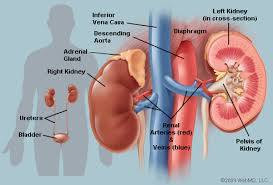Understanding Acute Kidney Injury: Etiology, Diagnostic Approaches, and Treatment Modalities
In this article, Dr. Sujit Chatterjee
discusses the origins, detection, and approaches to treating Acute Kidney
Injury (AKI), a severe medical condition that can lead to enduring
complications. By comprehending the factors that contribute to AKI, one can
take preventive measures against its occurrence.
Acute Kidney Injury (AKI)
refers to a sudden and potentially reversible deterioration in kidney function.
It constitutes a critical medical condition demanding immediate attention and
appropriate care. This article delves into the causes, diagnosis, and treatment
methods associated with AKI.
Causes of Acute Kidney Injury:
AKI can stem from various factors, including:
Reduced Blood Flow to the
Kidneys: Conditions such as dehydration, significant blood loss, heart failure,
or shock can impede blood circulation to the kidneys, resulting in AKI.
Kidney Damage: Direct harm to
the kidneys from sources like infections, urinary tract obstructions, or
specific medications can lead to AKI.
Severe Infections: Grave
infections like sepsis can induce inflammation across the body, including the
kidneys, culminating in AKI.
Autoimmune Disorders: Some
autoimmune conditions, like lupus nephritis or vasculitis, can lead to kidney
damage and subsequent AKI.
Diagnosing Acute Kidney Injury:
Early detection of AKI is pivotal for effective management. Healthcare
professionals employ various methods, including:
Blood Tests: These assess
levels of waste products like creatinine and blood urea nitrogen (BUN) in the
blood. Elevated levels indicate compromised kidney function.
Urine Tests: These evaluate
urine concentration, presence of blood, and anomalies, aiding in pinpointing
the underlying cause of AKI.
Imaging Studies: Techniques
like ultrasound, CT scans, or MRI offer visual insights into the kidneys,
aiding in AKI diagnosis and cause identification.
Kidney Biopsy: In certain
cases, a kidney biopsy may be conducted to obtain a small tissue sample for examination,
particularly when the cause of AKI remains unclear.
Treatment Approaches for Acute
Kidney Injury: Managing AKI involves addressing the root cause, handling
complications, and providing support to kidney function. Common strategies
include:
Fluid and Electrolyte
Management: Maintaining proper fluid and electrolyte balance is pivotal in AKI.
Intravenous fluids and medications are administered to restore appropriate
hydration and electrolyte levels.
Medications: Depending on the
cause of AKI, medications may be prescribed to manage infections, reduce
inflammation, or prevent further kidney damage. Dosages are tailored to the
patient’s condition.
Dialysis: In severe cases,
dialysis may be necessary to aid the kidneys in filtering waste products from the
blood. Dialysis helps manage complications and affords the kidneys time to
recover.
Treating Underlying Conditions:
Addressing the root causes of AKI, such as infections or obstructions, is
crucial for recovery. Specific treatments or interventions may be necessary
based on the identified cause.
Acute Kidney Injury stands as a
critical condition necessitating immediate attention. Recognizing its causes,
promptly diagnosing AKI, and implementing suitable treatment strategies are
vital for achieving a positive outcome. Early intervention can help avert
complications, facilitate kidney function recovery, and enhance the overall
prognosis for individuals affected by AKI.
Authored by: Dr. Sujit Chatterjee,
CEO at Dr. LH
Hiranandani Hospital, Powai, Mumbai"



Comments
Post a Comment